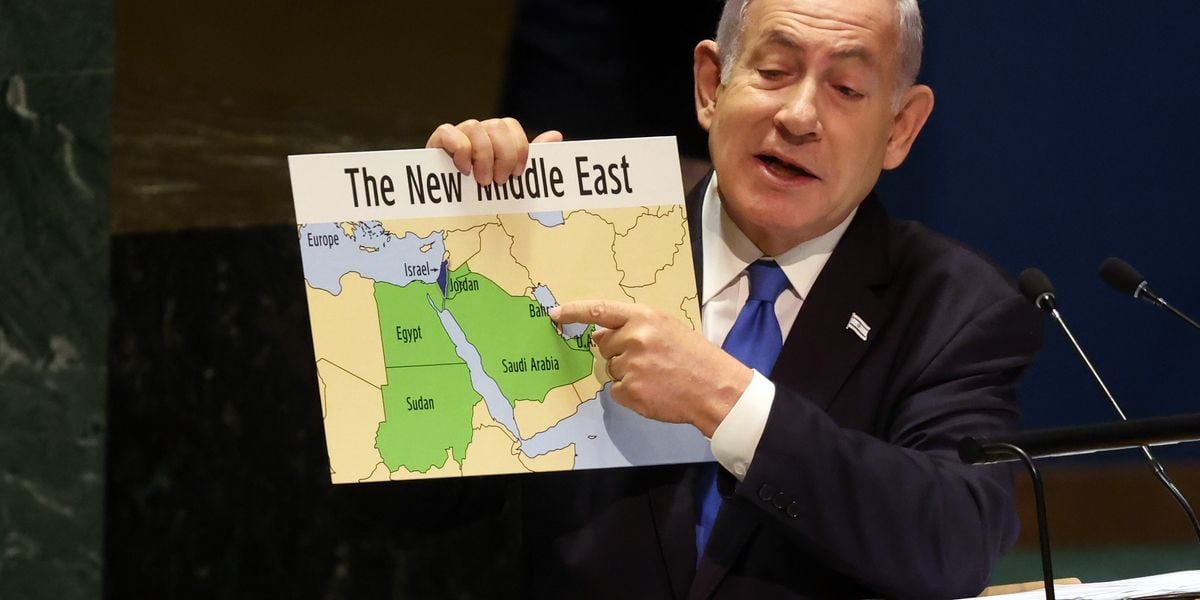Israeli Prime Minister Benjamin Netanyahu angered Palestinians and their defenders Friday after presenting a map of “The New Middle East” without Palestine during his speech to the United Nations General Assembly in New York.
Speaking to a largely empty chamber, Netanyahu—whose far-right government is widely considered the most extreme in Israeli history—showed a series of maps, including one that did not show the West Bank, East Jerusalem, or Gaza. These Palestinian territories have been illegally occupied by Israel since 1967, with the exception of Gaza—from which Israeli forces withdrew in 2005, while maintaining an economic stranglehold over the densely populated coastal strip.
Middle East Eyereported Netanyahu also held up a map of “Israel in 1948”—the year the modern Jewish state was established, largely through the ethnic cleansing of more than 750,000 Arabs—that erroneously included the Palestinian territories as part of Israel.
Palestinian Ambassador to Germany Laith Arafeh said on social media that there is “no greater insult to every foundational principle of the United Nations than seeing Netanyahu display before the UNGA a ‘map of Israel’ that straddles the entire land from the river to the sea, negating Palestine and its people, then attempting to spin the audience with rhetoric about ‘peace’ in the region, all the while entrenching the longest ongoing belligerent occupation in today’s world.”
As Middle East Eye noted:
The inclusion of Palestinian lands (and sometimes land belonging to Syria and Lebanon) in Israeli maps is common among believers of the concept of Eretz Yisrael—Greater Israel—a key part of ultra-nationalist Zionism that claims all of these lands belong to a Zionist state.
Earlier this year, Netanyahu's finance minister, Bezalel Smotrich, spoke from a podium adorned with a map that also included Palestine, Lebanon, and Syria as part of Greater Israel. In the same event, he said there was "no such thing as Palestinians."
The use of such maps by Israeli officials comes at a time when Netanyahu's ultra-nationalist government has taken steps that experts say amount to the "de jure annexation" of the occupied West Bank.
Netanyahu used the maps in an attempt to illustrate the increasing number of Arab countries normalizing relations with Israel under the Abraham Accords brokered by the administration of former U.S. President Donald Trump.
“There’s no question the Abraham Accords heralded the dawn of a new age of peace,” the Israeli prime minister said. “But I believe that we are at the cusp of an even more dramatic breakthrough, an historic peace between Israel and Saudi Arabia. Peace between Israel and Saudi Arabia will truly create a new Middle East.”
ritics have countered that peace between apartheid Israel and Arab dictatorships has come at the cost of advancing Palestinian rights. In the case of Morocco, the United States recognized the North African nation’s illegal annexation and brutal occupation of Western Sahara in exchange for normalization with Israel.
Netanyahu’s props on Friday reminded numerous observers of the time during his 2012 General Assembly speech when he used a cartoon drawing of a bomb to illustrate Iran’s progress on advancing a nuclear weapons program that both U.S. and Israeli intelligence agencies said did not exist.



I’m not well informed, but sometimes there are some news headline like “Iran Bans Weightlifter for Life Over Handshake With Israeli”
To be fair, I don’t recall anyone with reasonable arguments and approach doing something strong against them. I think all reasonable countries want to be on the good side of the USA
Ah okay. The book I read went through 2017, and I don’t really know of trustworthy news sources to keep up with current events in that region.
Yeah the political posturing like getting upset over handshakes is nothing new (altho AFAIK that kinda support has increased in recent years) but as far as actual substantial support, it has often been quite hard for Palestine to get it. (for many reasons)